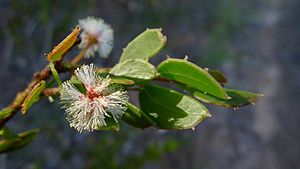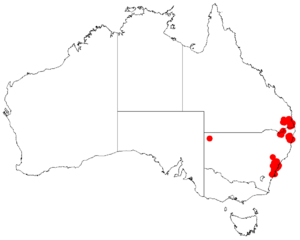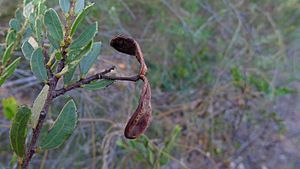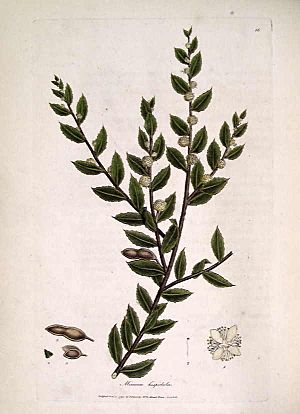Acacia hispidula facts for kids
Quick facts for kids Little harsh acacia |
|
|---|---|
 |
|
| Scientific classification | |
| Genus: |
Acacia
|
| Species: |
hispidula
|
 |
|
| Occurrence data from AVH | |
The Acacia hispidula, also known as little harsh acacia, rough-leaved acacia, or rough hairy wattle, is a type of Acacia plant. It grows naturally in eastern Australia.
What Does the Little Harsh Acacia Look Like?
This plant is usually a shrub (a bushy plant) that can grow up to 2 m (6 ft 7 in) (about 6.5 feet) tall. It has branches that spread out and are a bit rough, with tiny hairs.
It has green, leaf-like parts called phyllodes all year round. These phyllodes are usually narrow and oblong, about 10 to 30 mm (0.39 to 1.18 in) long and 3 to 10 mm (0.12 to 0.39 in) wide. They have a clear line down the middle.
The Little Harsh Acacia flowers between January and April. Its flowers are pale yellow to almost white and grow in round clusters. Each cluster has about 10 to 20 flowers.
After flowering, the plant forms blackish seed pods. These pods are smooth and can be up to 4.5 cm (1.8 in) long and 7.5 to 10.5 mm (0.30 to 0.41 in) wide. The seeds inside are oblong and measure about 7.5 to 8.5 mm (0.30 to 0.33 in) long.
How Did the Little Harsh Acacia Get Its Name?
The scientific name of a plant helps us understand its history and how it's related to other plants.
- The Little Harsh Acacia was first officially described in 1795 by a botanist named James Edward Smith. He called it Mimosa hispidula.
- Later, in 1806, Carl Ludwig Willdenow renamed it Acacia hispidula. This is the name it uses today.
- For a short time in 2003, it was called Racosperma hispidulum by Leslie Pedley, but it was changed back to Acacia in 2006.
The second part of its name, hispidula, comes from Latin. It means "hairy" or "bristly." This refers to the tiny hairs found on its branches and the edges of its phyllodes.
This plant is sometimes confused with another plant called Acacia aspera. However, Acacia aspera has longer and narrower phyllodes. The Little Harsh Acacia is also closely related to Acacia purpureopetala, which is found in Queensland.
Where Does the Little Harsh Acacia Grow?
The Little Harsh Acacia grows in different areas that are not connected. This is called a disjunct distribution.
You can find it around the Sydney area in New South Wales. Further north, it grows from Coffs Harbour and inland to Torrington. It also grows across the border into Queensland, as far north as Crows Nest and Brisbane.
This plant usually grows in Eucalyptus woodlands. It prefers shallow soils that are found over granite and sandstone rocks.



